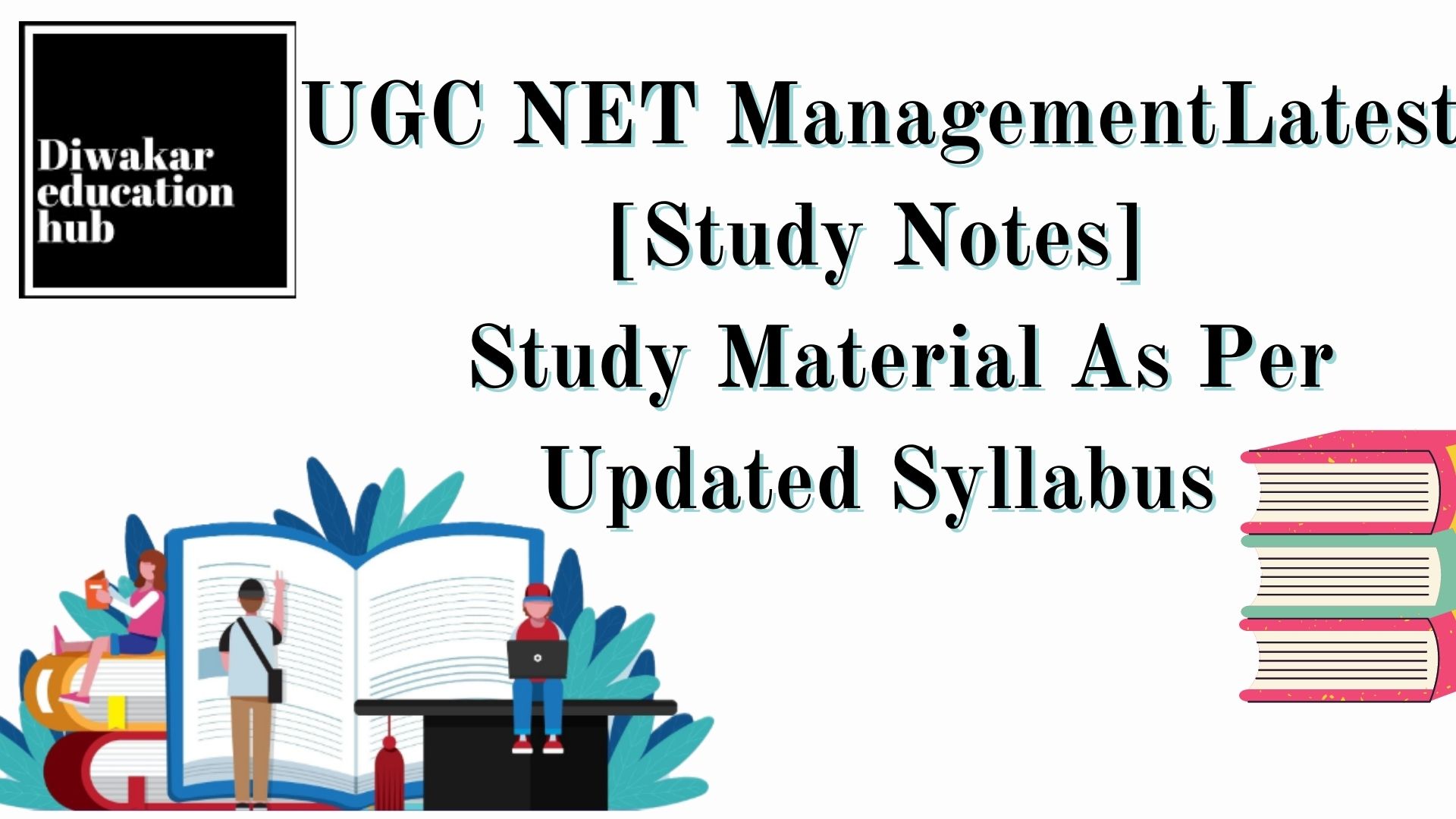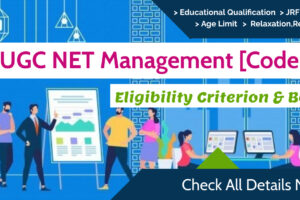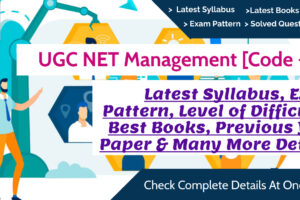UGC NET Management (Code-17) [Complete Study Notes/Study Material] As Per New Updated Syllabus 2025 [Download PDF].

In this Article Given the Process of Read All Units Notes of Management,To Check Process Click on Below Link given in Table
UGC NET Management (Code-17) [Latest Study Notes] Subject is Vast & Conceptual. In Syllabus Many Theortical & Practical Subject Include Like- Financial Management,Managerial Economics,Statistics,International Business , Accounting,Enterprenurship,Industrial Relation Etc. After Anaylsis Syllabus You Need best study notes to Qualified UGC NET Management Exam.Check Top Notch Notes Now
| Units Name | Links |
|---|---|
| Unit Name/Subject Name | Link to Read (Books) |
| Unit – I Management & Managerial Economics | https://wa.link/uieadb |
| Unit – II Organisational Behaviour | https://wa.link/uieadb |
| Unit – III Human Resource Management | https://wa.link/uieadb |
| Unit– IV Acounting & Financial Management | https://wa.link/uieadb |
| Unit –V Value & Returns (Finance) | https://wa.link/uieadb |
| Unit – VI Strategic Management | https://wa.link/uieadb |
| Unit –VII Consumer and Industrial Buying Behaviour | https://wa.link/uieadb |
| Unit –VIII Statistics for Management | https://wa.link/uieadb |
| Unit –IX International Business | https://wa.link/uieadb |
| If You Looking Best Study Notes for Management (Code-17) Design by Expert Faculties & JRF Qualfied Check Free Demo Now Click on Link – | https://wa.link/uieadb |
UGC NET Management Latest Syllabus 2025
| NET Management Unit–I: Business Management |
| Management: Concept, Process, Theories and Approaches, Management Rolesand SkillsFunctions: Planning, Organizing, Staffing, Coordinating and Controlling.Communication: Types, Process, and Barriers.Decision Making: Concept, Process, Techniques, and ToolsOrganization Structure and Design: Centralisation, Decentralisation, and Span of Control, Types, Authority, ResponsibilityManagerial Economics: Concept & ImportanceDemand analysis Utility Analysis, Indifference Curve, Elasticity & ForecastingMarket Structures: Market Classification & Price DeterminationNational Income: Concept, Types and MeasurementInflation: Concept, Types and Measurement, Business Ethics & CSR, Ethical Issues & Dilemma, Corporate Governance, Value-Based Organisation |
| Unit–II: Organizational Behaviour |
| Organizational Behaviour: Its Significance & TheoriesIndividual Behaviour: Personality, Attitude, Perception, Values, Learning andMotivationGroup Behaviour: Team Building, Leadership, Interpersonal Behaviour & Transactional Analysis, Group Dynamics, Organizational Culture & Climate, Workforce Diversity & Cross Culture Organisational Behaviour, Organisational Justice and Whistle Blowing, Emotions and Stress ManagementHuman Resource Management: Concept, Perspectives, Influences andRecent Trends, Human Resource Planning, Recruitment, and Selection, Induction, Training and Development, Job Analysis, Job Evaluation, and Compensation Management |
| Unit–III: HRM |
| Competency Mapping & Balanced Scoreboard Career Planning and Development Strategic Role of Human Resource Management Performance Management and Appraisal Talent Management & Skill Development Employee Engagement & Work-Life Balance Organization Development, Change & OD Interventions Industrial Relations: Disputes & Grievance Management, Labour Welfare and Social Security Trade Union & Collective Bargaining International Human Resource Management: HR Challenge of International, Business, Green HRM |
| Unit– IV: Financial Management & Accounting |
| Accounting Principles and Standards, Preparation of Financial StatementsFinancial Statement Analysis, Ratio Analysis, Funds Flow and Cash FlowAnalysis, DuPont Analysis, Preparation of Cost Sheet, Marginal Costing, Cost Volume Profit Analysis, Standard Costing & Variance Analysis, Financial Management, Concept & FunctionsCapital Structure: Theories, Cost of Capital, Sources, and Finance; Budgeting and Budgetary Control, Types and Process, Zero base BudgetingLeverages: Operating, Financial and Combined Leverages, EBIT–EPS, Analysis, Financial Breakeven Point & Indifference Level. |
| Unit–V: Business Finance |
| Value & Returns: Time Preference for Money, Valuation of Bonds and Shares,Risk and Returns; Capital Budgeting: Nature of Investment, Evaluation, Comparison of Methods;Risk and Uncertainty AnalysisDividend: Theories and DeterminationMergers and Acquisition: Corporate Restructuring, Value Creation, MergerNegotiations, Leveraged Buyouts, TakeoverPortfolio Management: CAPM, APTDerivatives: Options, Option Payoffs, Option Pricing, Forward Contracts &Future ContractsWorking Capital Management: Determinants, Cash, Inventory, Receivables andPayables Management, FactoringInternational Financial Management, Foreign exchange market |
| Unit–VI: Strategic Management |
| Strategic Management: Its Concept, Process, Decision & TypesStrategic Analysis: External Analysis, PEST, Porter’s Approach to industryanalysis, Internal Analysis: Resource-Based Approach, Value Chain AnalysisStrategy Formulation: SWOT Analysis, Corporate Strategy – Growth, Stability,Retrenchment, Integration and Diversification, Business Portfolio Analysis – BCG,GE Business Model, Ansoff’s Product-Market Growth MatrixStrategy Implementation: Challenges of Change, Developing ProgramsMckinsey 7s FrameworkMarketing: Concept, Orientation, Trends and Tasks, Customer Value andSatisfactionMarket Segmentation, Positioning and TargetingProduct and Pricing Decision: Product Mix, Product Life Cycle, New Productdevelopment, Pricing: Types and StrategiesPlace and promotion decision: Marketing channels and value networks, VMS,IMC, Advertising and Sales promotion |
| Unit–VII: Consumer and Industrial Buying Behaviour |
| Theories and Models of ConsumerBehaviorService Marketing: Managing Service Quality and Brands, Marketing Strategiesof Service Firms Customer Relationship Marketing: Relationship Building, Strategies, Values and ProcessBrand Management: Role of Brands, Brand Equity, Equity Models, Developinga Branding Strategy; Brand Name Decisions, Brand Extensions, and LoyaltyLogistics and Supply Chain Management, Drivers, Value creation, Supply Chain Design, Designing and Managing Sales Force, Personal Selling Retail Marketing: Recent Trends in India, Types of Retail Outlets.Emerging Trends in Marketing: Concept of e-Marketing, Direct Marketing,Digital Marketing and Green MarketingInternational Marketing: Entry Mode Decisions, Planning Marketing Mix forInternational Markets |
| Unit–VIII – Statistics for Management |
| Statistics for Management: Concept, Measures Of Central Tendency and Dispersion, Probability Distribution: Binominal, Poison, Normal and Exponential, Data Collection & Questionnaire DesignSampling: Concept, Process, and TechniquesHypothesis Testing: Procedure; T, Z, F, Chi-square testsCorrelation and Regression AnalysisOperations Management: Role and ScopeOperation Research: Transportation, Queuing Decision Theory, PERT / CPMFacility Location and Layout: Site Selection and Analysis, Layout – Design andProcessEnterprise Resource Planning: ERP Modules, ERP implementation; Scheduling; Loading, Sequencing, and Monitoring; Quality Management and Statistical Quality Control, Quality Circles, Total QualityManagement: KAIZEN, Benchmarking, Six Sigma; ISO 9000 Series Standards |
| Unit–IX: International Business |
| International Business: Managing Business in Globalization Era; Theories of International Trade; Balance of payment Foreign Direct Investment: Benefits and Costs; Multilateral regulation of Trade and Investment under WTO; International Trade Procedures and Documentation; EXIM PoliciesData Warehousing, Data Mining, and Knowledge Management: ConceptsManaging Technological ChangeRole of International Financial Institutions: IMF and World BankInformation Technology: Use of Computers in Management Applications; MIS,DSS, Artificial Intelligence and Big Data |
| Unit–X: Entrepreneurship Development |
| Entrepreneurship Development: Its Concept, Types, Theories, and Process, Developing Entrepreneurial CompetenciesInnovations in Business: Types of Innovations, Creating and Identifying, Women Entrepreneurship and Rural EntrepreneurshipIntrapreneurship: Concept and Process, Opportunities, Screening of Business IdeasBusiness Plan and Feasibility Analysis: Concept and Process of Technical,Market and Financial Analysis; Micro and Small Scale Industries in India; Role of Government in Promoting SSISickness in Small Industries: Reasons and RehabilitationInstitutional Finance to Small Industries: Financial Institutions, CommercialBanks, Cooperative Banks, Micro Finance |
UGC NET Management Latest Syllabus in Hindi 2025 –
| NET Management Unit–I: Business Management |
| प्रबंधन: अवधारणा, प्रक्रिया, सिद्धांत और दृष्टिकोण, प्रबंधन भूमिकाएं और कौशल कार्य: योजना, आयोजन, स्टाफिंग, समन्वय और नियंत्रण। संचार: प्रकार, प्रक्रिया और बाधाएं। निर्णय लेना: अवधारणा, प्रक्रिया, तकनीक और उपकरण संगठन संरचना और डिजाइन: केंद्रीकरण, विकेंद्रीकरण, और नियंत्रण की अवधि, प्रकार, प्राधिकरण, उत्तरदायित्व प्रबंधकीय अर्थशास्त्र: अवधारणा और महत्व मांग विश्लेषण उपयोगिता विश्लेषण, उदासीनता वक्र, लोच और पूर्वानुमान बाजार संरचनाएं: बाजार वर्गीकरण और मूल्य निर्धारण राष्ट्रीय आय: अवधारणा, प्रकार और मापन मुद्रास्फीति: अवधारणा, प्रकार और मापन, व्यावसायिक नैतिकता और सीएसआर, नैतिक मुद्दे और दुविधा, कॉर्पोरेट प्रशासन, मूल्य-आधारित संगठन |
| Unit–II: Organizational Behaviour |
| संगठनात्मक व्यवहार: इसका महत्व और सिद्धांत व्यक्तिगत व्यवहार: व्यक्तित्व, दृष्टिकोण, धारणा, मूल्य, सीखना और प्रेरणा समूह व्यवहार: टीम निर्माण, नेतृत्व, पारस्परिक व्यवहार और लेनदेन विश्लेषण, समूह गतिशीलता, संगठनात्मक संस्कृति और जलवायु, कार्यबल विविधता और क्रॉस संस्कृति संगठनात्मक व्यवहार, संगठनात्मक न्याय और सीटी बजाना, भावनाएं और तनाव प्रबंधन मानव संसाधन प्रबंधन: अवधारणा, परिप्रेक्ष्य, प्रभाव और हाल के रुझान, मानव संसाधन योजना, भर्ती, और चयन, प्रेरण, प्रशिक्षण और विकास, नौकरी विश्लेषण, नौकरी मूल्यांकन, और मुआवजा प्रबंधन |
| Unit–III: HRM |
| योग्यता मानचित्रण और संतुलित स्कोरबोर्ड कैरियर योजना और विकास मानव संसाधन प्रबंधन की रणनीतिक भूमिका प्रदर्शन प्रबंधन और मूल्यांकन प्रतिभा प्रबंधन और कौशल विकास कर्मचारी सगाई और कार्य-जीवन संतुलन संगठन विकास, परिवर्तन और ओडी हस्तक्षेप औद्योगिक संबंध: विवाद और शिकायत प्रबंधन, श्रम कल्याण और सामाजिक सुरक्षा ट्रेड यूनियन और सामूहिक सौदेबाजी अंतर्राष्ट्रीय मानव संसाधन प्रबंधन: अंतर्राष्ट्रीय, व्यापार, हरित एचआरएम की मानव संसाधन चुनौती |
| Unit– IV: Financial Management & Accounting |
| लेखांकन सिद्धांत और मानक, वित्तीय विवरण तैयार करना वित्तीय विवरण विश्लेषण, अनुपात विश्लेषण, फंड फ्लो और कैश फ्लो विश्लेषण, ड्यूपॉन्ट विश्लेषण, लागत पत्रक तैयार करना, सीमांत लागत, लागत मात्रा लाभ विश्लेषण, मानक लागत और भिन्नता विश्लेषण, वित्तीय प्रबंधन, अवधारणा और कार्य पूंजी संरचना : सिद्धांत, पूंजी की लागत, स्रोत और वित्त; बजट और बजटीय नियंत्रण, प्रकार और प्रक्रिया, शून्य आधार बजट लाभ: परिचालन, वित्तीय और संयुक्त उत्तोलन, EBIT-EPS, विश्लेषण, वित्तीय ब्रेकईवन बिंदु और उदासीनता स्तर। |
| Unit–V: Business Finance |
| मूल्य और रिटर्न: पैसे के लिए समय वरीयता, बांड और शेयरों का मूल्यांकन, जोखिम और रिटर्न; पूंजी बजट: निवेश की प्रकृति, मूल्यांकन, तरीकों की तुलना; जोखिम और अनिश्चितता विश्लेषण लाभांश: सिद्धांत और निर्धारण विलय और अधिग्रहण: कॉर्पोरेट पुनर्गठन, मूल्य निर्माण, विलय बातचीत, लीवरेज बायआउट, टेकओवर पोर्टफोलियो प्रबंधन: सीएपीएम, एपीटीडीरिवेटिव्स: विकल्प, विकल्प मूल्य निर्धारण, भुगतान, विकल्प वायदा अनुबंध और भविष्य अनुबंध कार्यशील पूंजी प्रबंधन: निर्धारक, नकद, सूची, प्राप्य और भुगतान योग्य प्रबंधन, फैक्टरिंग अंतर्राष्ट्रीय वित्तीय प्रबंधन, विदेशी मुद्रा बाजार |
| Unit–VI: Strategic Management |
| सामरिक प्रबंधन: इसकी अवधारणा, प्रक्रिया, निर्णय और प्रकार सामरिक विश्लेषण: बाहरी विश्लेषण, कीट, उद्योग विश्लेषण के लिए पोर्टर का दृष्टिकोण, आंतरिक विश्लेषण: संसाधन-आधारित दृष्टिकोण, मूल्य श्रृंखला विश्लेषण रणनीति तैयार करना: एसडब्ल्यूओटी विश्लेषण, कॉर्पोरेट रणनीति – विकास, स्थिरता, छंटनी, एकीकरण और विविधीकरण, व्यापार पोर्टफोलियो विश्लेषण – बीसीजी, जीई बिजनेस मॉडल, एंसॉफ के उत्पाद-बाजार विकास मैट्रिक्स रणनीति कार्यान्वयन: परिवर्तन की चुनौतियां, विकासशील कार्यक्रम मैकिन्से 7 एस फ्रेमवर्क मार्केटिंग: अवधारणा, अभिविन्यास, रुझान और कार्य, ग्राहक मूल्य और संतुष्टि बाजार विभाजन, स्थिति और लक्ष्यीकरण उत्पाद और मूल्य निर्धारण निर्णय: उत्पाद मिक्स, उत्पाद जीवन चक्र, नया उत्पाद विकास, मूल्य निर्धारण: प्रकार और रणनीतियाँ स्थान और प्रचार निर्णय: मार्केटिंग चैनल और मूल्य नेटवर्क, VMS, IMC, विज्ञापन और बिक्री प्रचार |
| Unit–VII: Consumer and Industrial Buying Behaviour |
| उपभोक्ता व्यवहार के सिद्धांत और मॉडल सेवा विपणन: सेवा गुणवत्ता और ब्रांड का प्रबंधन, सेवा फर्मों की विपणन रणनीतियाँ ग्राहक संबंध विपणन: संबंध निर्माण, रणनीतियाँ, मूल्य और प्रक्रिया ब्रांड प्रबंधन: ब्रांड की भूमिका, ब्रांड इक्विटी, इक्विटी मॉडल, विकासशील ब्रांडिंग रणनीति; ब्रांड नाम निर्णय, ब्रांड एक्सटेंशन, और वफादारी रसद और आपूर्ति श्रृंखला प्रबंधन, चालक, मूल्य निर्माण, आपूर्ति श्रृंखला डिजाइन, डिजाइनिंग और बिक्री बल का प्रबंधन, व्यक्तिगत बिक्री खुदरा विपणन: भारत में हालिया रुझान, खुदरा आउटलेट के प्रकार। विपणन में उभरते रुझान: अवधारणा ई-मार्केटिंग, डायरेक्ट मार्केटिंग, डिजिटल मार्केटिंग और ग्रीन मार्केटिंग की अंतर्राष्ट्रीय मार्केटिंग: एंट्री मोड डिसीजन, प्लानिंग मार्केटिंग मिक्स फॉर इंटरनेशनल मार्केट्स |
| Unit–VIII – Statistics for Management |
| प्रबंधन के लिए सांख्यिकी: अवधारणा, केंद्रीय प्रवृत्ति और फैलाव के उपाय, संभाव्यता वितरण: द्विपद, जहर, सामान्य और घातीय, डेटा संग्रह और प्रश्नावली डिजाइन नमूनाकरण: अवधारणा, प्रक्रिया, और तकनीक परिकल्पना परीक्षण: प्रक्रिया; टी, जेड, एफ, ची-स्क्वायर परीक्षण सहसंबंध और प्रतिगमन विश्लेषण संचालन प्रबंधन: भूमिका और दायरा संचालन अनुसंधान: परिवहन, कतार निर्णय सिद्धांत, पीईआरटी / सीपीएमएफ सुविधा स्थान और लेआउट: साइट चयन और विश्लेषण, लेआउट – डिजाइन और प्रक्रिया उद्यम संसाधन योजना: ईआरपी मॉड्यूल, ईआरपी कार्यान्वयन ; निर्धारण; लोड हो रहा है, अनुक्रमण, और निगरानी; गुणवत्ता प्रबंधन और सांख्यिकीय गुणवत्ता नियंत्रण, गुणवत्ता मंडल, कुल गुणवत्ता प्रबंधन: काइज़न, बेंचमार्किंग, सिक्स सिग्मा; आईएसओ 9000 श्रृंखला मानक |
| Unit–IX: International Business |
| अंतर्राष्ट्रीय व्यापार: वैश्वीकरण युग में व्यवसाय का प्रबंधन; अंतर्राष्ट्रीय व्यापार के सिद्धांत; भुगतान संतुलन प्रत्यक्ष विदेशी निवेश: लाभ और लागत; विश्व व्यापार संगठन के तहत व्यापार और निवेश का बहुपक्षीय विनियमन; अंतर्राष्ट्रीय व्यापार प्रक्रियाएं और दस्तावेज़ीकरण; EXIM नीतियां डेटा वेयरहाउसिंग, डेटा माइनिंग, और ज्ञान प्रबंधन: अवधारणाएं तकनीकी परिवर्तन अंतर्राष्ट्रीय वित्तीय संस्थानों की भूमिका: आईएमएफ और विश्व बैंक सूचना प्रौद्योगिकी: प्रबंधन अनुप्रयोगों में कंप्यूटर का उपयोग; एमआईएस, डीएसएस, आर्टिफिशियल इंटेलिजेंस और बिग डेटा |
| Unit–X: Entrepreneurship Development |
| उद्यमिता विकास: इसकी अवधारणा, प्रकार, सिद्धांत और प्रक्रिया, उद्यमिता दक्षताओं का विकास व्यवसाय में नवाचार: नवाचारों के प्रकार, निर्माण और पहचान, महिला उद्यमिता और ग्रामीण उद्यमिता इंट्राप्रेन्योरशिप: अवधारणा और प्रक्रिया, अवसर, व्यावसायिक विचारों की स्क्रीनिंग, व्यवसाय योजना और व्यवहार्यता विश्लेषण: अवधारणा और तकनीकी, बाजार और वित्तीय विश्लेषण की प्रक्रिया; भारत में सूक्ष्म और लघु उद्योग; लघु उद्योगों में एसएसआईएस बीमारी को बढ़ावा देने में सरकार की भूमिका: कारण और पुनर्वास लघु उद्योगों को संस्थागत वित्त: वित्तीय संस्थान, वाणिज्यिक बैंक, सहकारी बैंक, सूक्ष्म वित्त |
How to Crack the UGC NET Management Exam 2024 ?
- Examine the most recent exam trend and syllabus.
- Prepare a systematic timetable
- You can make a list of UGC NET Important dates and activities so that you can review them at the last minute.
- Make use of best Management UGC NET Books or NTA NET Study Materials.
- Solve previous years’ UGC NET papers to learn the exact paper pattern, labeling weightage, and exam difficulty level.
- Check your answers with UGC NET Answer Keys and analyze your results after completing solving the papers.
- As far as possible, solve the NET Mock Test Paper. It will help to improve your exam pace and accuracy.
- For statistics and probability-type questions, you must work on improving techniques of approximation and interpretation.
- Cover Each & Every Topic thoroughly Do Weekly Revision of All Topics which you learned Last Week
UGC NET Management 4-Month’s Preparation Plan 2025
This gives you 4 months to prepare for the examination. Now we are fully aware of the fact that a single time-table cannot suit everyone’s preference. So, being mindful of that, we have prepared you a standard plan which you can modify as per your Schedule and daily schedule.
| Preparation Time | 4 Months (16 Weeks) |
| Total Chapters/ Topics to Prepare | 10 |
| Total Sub-Topics | Over 80 + |
| Studying Hours Per Day | 4 – 5 Hours |
| Number of Days Required to Prepare Each Unit | 10 Days |
| Number of Chapters Completed in a Month | 2 Chapters |
| Break Days or Extra Days Each Month | 2 – 3 Days* |
| Time Taken to Complete Entire Syllabus | 3.5 Months |
| Remaining Time | 15 Days |
| Days to Solve Sample Papers/ Model Papers/ Mock Tests | 20 Days |
| Days Left for Final Revision | 15 Days |
FAQs on UGC NET 2024 Management Study Notes-
What are the study materials offered by Diwakar Education Hub for the UGC NET Management Exam?
Ans- The Diwakar Education Hub offers a complete package of study materials to prepare for the UGC NET Management Exam which has 10 Unit Wise Booklets With Theory + Unit Wise 4000+ Question Answers As per the Exam Pattern the Details Notes Cover Each & Every Topic of the Syllabus.
Why the notes important for UGC NET Management Exam?
Ans- Yes, the UGC NET Notes Management are very vital for the students to revise the complete portions that they studied for the UGC NET History Exam.
How can the students prepare the UGC NET Management Notes ?
Ans- Students can prepare the UGC NET Management Study material from the UGC NET History Study Materials. They can go for our Notes Thoroughly for the preparation of the UGC NET Management Notes.
What kind of books can be used to prepare the UGC NET Management Notes?
Ans- There are Many Books Available in the Market but in a Single book Not cover all which you need to cover for an Exam perspective. But a Detailed Study Material Like Have you will get all that you need to crack this Exam.
What are some tips to take notes for the UGC NET Management Exam?
Ans-Candidates can go for online searches to get notes for complicated subjects. Candidates can make charts like for remembering the years of the wars. Candidates can make use of several books for a single topic that will improve their understanding. Through all these steps candidates can make their own UGC NET Management Notes or Can Choose Our Notes.
Tag:arihant ugc net management book pdf download, best study material for ugc net management, best study notes ugc net Management, marketing management notes for ugc net pdf, strategic management notes for ugc net, trueman ugc net management pdf free download, ugc net management books, ugc net management books pdf, ugc net management handwritten notes, ugc net management handwritten notes free download pdf, ugc net management notes pdf, ugc net management notes pdf free, ugc net management study material, ugc net management study material free download pdf, ugc net Management Study Material pdf, ugc net management study notes, ugc net Management study notes PDF, Ugc net management study notes pdf download, Ugc net management study notes pdf free download, ugc net management unit 1 notes, ugc net management unit 1 notes pdf, ugc net paper 2 study material pdf free download, ugc-net management topper notes



